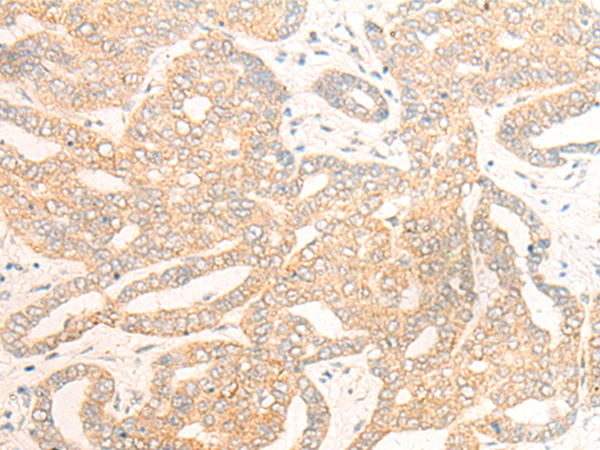
| WB | 咨询技术 | Human,Mouse,Rat |
| IF | 咨询技术 | Human,Mouse,Rat |
| IHC | 1/20-1/100 | Human,Mouse,Rat |
| ICC | 技术咨询 | Human,Mouse,Rat |
| FCM | 咨询技术 | Human,Mouse,Rat |
| Elisa | 1/5000-1/10000 | Human,Mouse,Rat |
| Aliases | BCRG2; BCRP2; WDR22; D14S1461E |
| Host/Isotype | Rabbit IgG |
| Antibody Type | Primary antibody |
| Storage | Store at 4°C short term. Aliquot and store at -20°C long term. Avoid freeze/thaw cycles. |
| Species Reactivity | Human, Mouse |
| Immunogen | Synthetic peptide of human DCAF5 |
| Formulation | Purified antibody in PBS with 0.05% sodium azide and 50% glycerol. |
+ +
以下是关于DCAF5抗体的3篇代表性文献,涵盖其功能研究和应用场景:
---
1. **文献名称**:*DCAF5 regulates ribosomal RNA synthesis by recruiting the histone demethylase KDM2A to ribosomal DNA*
**作者**:Li, Y., et al.
**摘要**:本研究利用DCAF5特异性抗体,通过免疫共沉淀和ChIP-seq技术,揭示了DCAF5通过结合组蛋白去甲基化酶KDM2A调控核糖体RNA合成的机制,为癌症中rDNA表观遗传失调提供新见解。
---
2. **文献名称**:*The role of DCAF5 in DNA damage response via modulating BRCA1 stability*
**作者**:Wang, X., et al.
**摘要**:通过Western blot和免疫荧光(使用DCAF5抗体),作者发现DCAF5通过泛素-蛋白酶体途径降解BRCA1.影响DNA损伤修复,提示DCAF5抗体在乳腺癌治疗中的潜在诊断价值。
---
3. **文献名称**:*CRL4-DCAF5 E3 ligase complex targets the transcription factor PAX3 for ubiquitination*
**作者**:Zhang, H., et al.
**摘要**:该研究开发了兔源DCAF5多克隆抗体,验证了CRL4-DCAF5复合物对PAX3的泛素化作用,揭示了其在胚胎发育异常中的病理机制,为相关疾病提供治疗靶点。
---
**备注**:若需获取全文或更早期研究,建议在PubMed或Web of Science中以“DCAF5 antibody”结合“CRL4 complex”“ubiquitination”等关键词检索。部分研究可能侧重方法学(如抗体开发),需根据具体需求筛选。
The DCAF5 (DDB1- and CUL4-associated factor 5) antibody is a research tool targeting the DCAF5 protein, a substrate receptor component of the CUL4-DDB1 E3 ubiquitin ligase complex. DCAF5. also known as WDR40A, contains WD40 repeat domains that mediate protein-protein interactions, enabling substrate recognition for ubiquitination. This post-translational modification typically tags proteins for proteasomal degradation, regulating processes like DNA repair, cell cycle progression, and chromatin remodeling.
DCAF5 has gained attention due to its role in human diseases. Studies link it to cancer progression through dysregulated degradation of tumor suppressors or oncoproteins. Notably, DCAF5 is implicated in the turnover of the histone demethylase KDM4A, influencing epigenetic regulation. In hematological malignancies, DCAF5 overexpression correlates with genomic instability. Additionally, DCAF5 interacts with viral proteins, potentially aiding viral immune evasion.
Antibodies against DCAF5 are essential for studying its expression patterns, interactome, and subcellular localization via techniques like Western blot, immunofluorescence, and co-immunoprecipitation. They also facilitate functional studies using knockdown/knockout models. Recent interest in targeting ubiquitination pathways for cancer therapy has spurred the development of DCAF5-specific antibodies as potential diagnostic tools or therapeutic companions. However, the complete spectrum of DCAF5 substrates and regulatory mechanisms remains under investigation, necessitating further research to fully exploit its clinical potential.
×